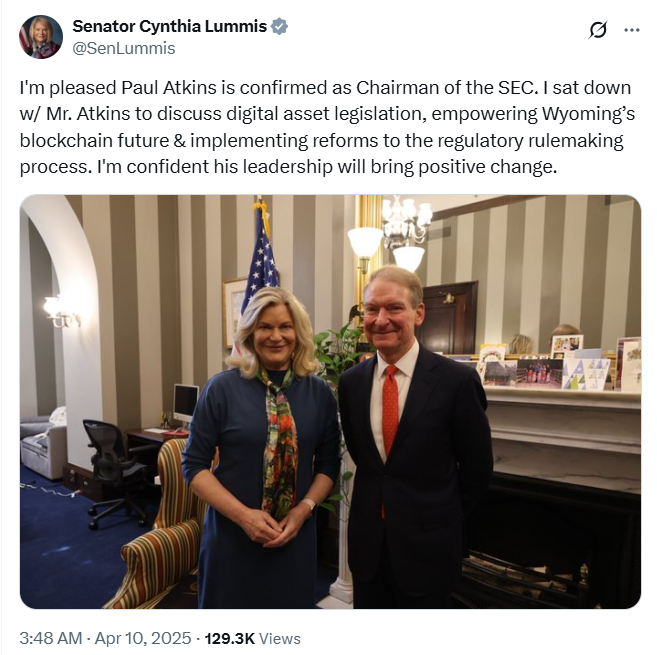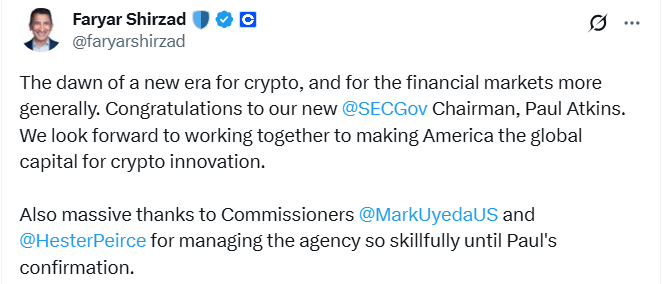The cryptocurrency sector has embraced the appointment of Paul Atkins, a seasoned American entrepreneur and former US Securities and Exchange Commissioner, as the new chair of the agency.
Atkins’ confirmation process took several months. He testified before the Senate on March 27, where he detailed his proposed strategies for securities regulation in the United States, alongside his perspectives on digital assets.
Atkins succeeds acting chair Mark Uyeda in leading the agency, which began reversing several legal proceedings and enforcement actions against cryptocurrency businesses when Donald Trump was in office. However, these actions have yet to provide clear regulatory guidance.
As Atkins steps into his new role, the blockchain community is optimistic about finally receiving the long-awaited clarity. So, who is Paul Atkins and what does the industry anticipate?

Senator Cynthia Lummis celebrated the confirmation. Source: Cynthia Lummis
Paul Atkins aims to establish frameworks for the crypto sector
An alumnus of Wofford College and Vanderbilt, Atkins boasts a rich background in finance. He began his career at Davis Polk and Wardwell before working for two past SEC chairmen from 1990 to 1994.
During his tenure under Chairman Breeden, he played a pivotal role in initiatives aimed at lowering barriers for small businesses and middle-market firms to enter capital markets.
After his stints at PwC and Coopers and Lybrand, Atkins returned to the SEC as a commissioner under George W. Bush’s administration.
At the SEC, Atkins focused on enhancing compliance with SEC rules within the financial services sector. He collaborated with law enforcement in cases involving investor harm, such as the Bennett Funding incident, a significant $1 billion Ponzi scheme that left 20,000 investors with substantial losses.
After completing his term as commissioner, he founded and led Potomak Global Partners, a consultancy for banks and financial services entities.
In the lead-up to his 52-44 confirmation vote, which largely followed party lines, Atkins faced tough questioning from the Senate Committee on Banking, Housing and Urban Affairs. During the hearing, he stated that his primary goal as chair would be to establish a solid regulatory foundation for digital assets through a “rational, coherent and principled approach.”
Related: Trump’s nomination for SEC chair advances from committee
He articulated that the existing “ambiguous and non-existent regulation of digital assets” is detrimental to innovation and the industry. More generally, he expressed that global players are willing to invest in the US, but “the present regulatory landscape for our financial system stifles investment and often punishes success.”
Congressman Tom Emmer commented on Atkins’ nomination, saying, “It’s gonna be great,” noting that the previous chair had “set a pretty low bar.” Emmer asserted that the SEC can soon deliver the clarity awaited by the industry: “We need stablecoins. We need market structure. We need clarity and certainty within the system.”
Faryar Shirzad, chief policy officer at Coinbase, described the confirmation as the “dawn of a new era.”

Source: Faryar Shirzad
SEC actions under Uyeda hint at crypto priorities ahead
While predicting the future is challenging, recent analysis suggests that the recent dismissal of legal cases and enforcement actions may reveal the SEC’s future stance on cryptocurrency regulation — or its absence.
Related: US government actions hint at forthcoming cryptocurrency regulation
The dismissal of cases pertaining to “the unregistered sale and offer of securities under the Securities Act of 1933 and acting unregistered as a broker, dealer, clearing agency, and exchange” implies that the SEC might not categorize the assets in question as securities.
This notion is reinforced by recent announcements from the SEC that activities like proof-of-work mining, pooled mining, and dollar-pegged stablecoins do not fall under securities regulations. Overall, this suggests that cryptocurrencies may not be treated as subject to securities law by the SEC.
The crypto agenda may face obstacles due to recent SEC dismissals
A significant point of contention regarding Atkins’ ascension to SEC chair is the recent wave of staff dismissals within the agency. The Trump administration’s efforts to cut spending through temporary measures at the Department of Government Efficiency (DOGE) have impacted the securities regulator as well.
According to reports, various buyout and dismissal initiatives are set to effectively reduce the SEC’s workforce by 10% of its 5,000 employees in the coming months, with estimates suggesting it could be closer to 15%.
DOGE leader Elon Musk, who has had his own contentious history with the SEC, is reportedly advocating for further reductions to an already diminished SEC budget and staff.
A group of notable securities law professors, referred to as the “Shadow SEC,” has raised concerns about the recent cuts, warning that this could lead to chaotic financial markets, extended review periods for registration statements, and weakened enforcement capabilities.
Establishing a new framework for digital assets, particularly from the ground up, could be delayed if the agency continues to lose personnel and expertise while Musk enacts further cuts in Washington.
Magazine: Memecoin degeneracy is funding groundbreaking anti-aging research
